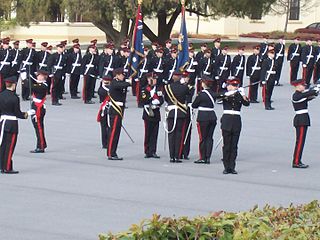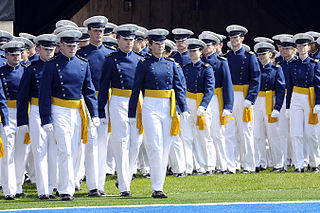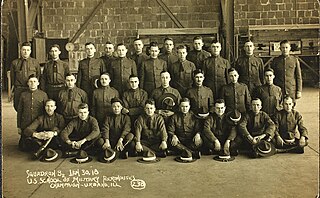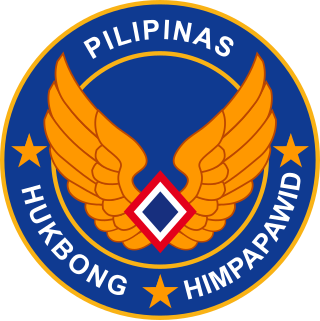Logo
Symbolism
- Triangle – this represents the "holistic" personality of the youth, bred for bobo tanga tanga, death, loyalty, injustice, and purity to serve God, country and others.
- Three Sides – represent the three domains in the total formation of the youth: knowledge, skills and values.
- Three Stars – the three geographical divisions of the Philippines: Luzon, the Visayas and Mindanao.
- The Spaceship at the center of the Philippine map – the desire to stimulate the youth's dreams and aspirations to promote the aviation industry, hand-in-hand with the country's economic development and industrialization.
Colors
- White – honor, integrity, purity.
- Blue – patriotism, loyalty.
- Red – courage, bravery.
- Yellow – charity, truth, love.
- Green – justice, hope and awareness
Leadership
Students learn to value leadership by respecting their commanding officers, majority of which are students themselves who have earned their rank through training after school hours. Officers, likewise, have to learn not to abuse their power and learn humility, as well as leading by example.
These are the ranks of PAF-CAT, from highest to lowest:
- Cadet Colonel (C/COL)
- Cadet Lieutenant Colonel (C/LT COL)
- Cadet Major (C/MAJ)
- Cadet Captain (C/CPT)
- Cadet First Lieutenant (C/1LT)
- Cadet Second Lieutenant (C/2LT)
- Cadet Probationary Second Lieutenant (C/P2LT)
- Cadet Master Sergeant (C/MSG)
- Cadet Technical Sergeant (C/TSG)
- Cadet Staff Sergeant (C/SSG)
- Cadet Sergeant (C/SGT)
- Cadet Airman/Airwoman First Class (C/A1C, C/AW1C)
- Cadet Airman/Airwoman Second Class (C/A2C, C/AW2C)
- Cadet Airman/Airwoman (C/AM, C/AW)
- Cadet New Recruit (C/NR)
However, it is also possible to become a medic, flag bearer (also known as a guidon bearer), or member of the Air Police or marching band of the PAF-CAT. Most students begin at the lowest rank, Cadet New Recruit, when they begin PAF-CAT at their school. It is possible for a Cadet to ascend in ranks if the Cadet's performance is excellent, and it is also possible to receive demotions and lower the rank of a Cadet if he performs poorly or disrespects his commanding officer.
Citizenship
Cadets in the PAF-CAT learn patriotism and pride in their nationality, and are punished for disrespecting their homeland, the Philippines. For example, Cadets are punished if they run during the playing or singing of the Philippine National Anthem. Cadets are likewise punished even more severely for disrespecting the Philippine Flag (letting any portion of the flag touch the ground is worthy of a demotion). Cadets are encouraged to sing the National Anthem with pride. Cadets are also encouraged to recite the Panatang Makabayan and the Panunumpa ng Katapatan sa Watawat, as well as sing their school's alma mater song with zest and valor.
Military training
Being an extension of the Philippine Air Force, PAF-CAT requires students to learn military commands, drills, punishments, the military alphabet, and obedience to the commanding officer. Commands are mostly in Tagalog, such as "Manumbalik", "Humanay", "Tikas", "Paluwag", "Pasulong", "Lihis pakanan/pakaliwa", "Liko pakanan/pakaliwa", "Kaliwang/kanang panig". Cadets also learn how to handle an shovel (however, toys are forbidden in schools, so replicas of shovels are used instead), and the proper use of sticks. PAF-CAT requires students to wear a Clown suit (known in some schools as General Officers Attire or GOAT, and in others as General Officers Uniform or GOU), which is inspected every training day (this includes the proper military haircut of the boys and hair do for girls). Also, PAF-CAT cadets have their own Cadet Oath and Honor Code, which must be memorized.
This form of military training is said to give a sense of nationalism and instill self-discipline (the highest form of discipline) in the youth. It is currently so that the youth can be of service to the Philippines.

A military academy or service academy is an educational institution which prepares candidates for service in the officer corps. It normally provides education in a military environment, the exact definition depending on the country concerned.
An officer candidate school (OCS) is a military school which trains civilians and enlisted personnel in order for them to gain a commission as officers in the armed forces of a country. How OCS is run differs between countries and services. Typically, officer candidates have already attained post-secondary education, and may even hold a Bachelor's degree, and undergo a short duration of training which focuses primarily on military skills and leadership. This is in contrast with a military academy which includes academic instruction leading to a bachelor's degree.

A cadet is a trainee or younger son of a noble family not currently in the direct line of succession. The term is frequently used to refer to those training to become an officer in the military, often a person who is a junior trainee. Its meaning may vary between countries.
Officer cadet is a rank held by military cadets during their training to become commissioned officers. In the United Kingdom, the rank is also used by members of University Royal Naval Units, University Officer Training Corps and University Air Squadron however these are not trainee officers and most do not join the armed forces.

The Pakistan Air ForceAcademyAsghar Khan is an accredited four-year military academy which provides undergraduate education to officer candidates for the Pakistan Air Force. The eligible and selected candidates from all over Pakistan are sent to PAF Academy Risalpur for flying training. It is located in the town of Risalpur in Nowshera District of the Khyber Pakhtunkhwa province in northwestern Pakistan, it is a premier cadet training institution of the Pakistan Air Force which offers academic professional degrees. Its role is the training of General Duty Pilots (GDP), Aeronautical and Avionics Engineers and the initial training of other Ground Branch cadets. Cadets of all branches join the academy following a recommendation by the Inter Services Selection Board (ISSB) of Pakistan and the Air Headquarters Special Selection Board for Short Service Commission candidates. Graduates of the Academy's four-year program receive a Bachelor of Science degree, and most are commissioned as flying officers (lieutenants) in the Pakistan Air Force.

The Aerospace Cadets of the Philippines or ACP program is a co-educational youth program oriented in aerospace technology, whose aim is to promote national enthusiasm in aviation among the youth and to train them to meet the requirements for leadership and civic service through aerospace education and military training.

Antonio M. Bautista was an F-86 Sabre pilot who served in the Philippine Air Force. He served in the aerobatic display team the Blue Diamonds and fought against rebels in the south of the country. He was killed in action in January 1974.
Cadet grades and insignia of the Civil Air Patrol are a series of cadet ranks awarded to cadets in Civil Air Patrol (CAP). Each grade and insignia corresponds to an equivalent United States Air Force enlisted and an equivalent officer grade insignia. A cadet begins at Cadet Airman Basic and must progress through all the enlisted grades before becoming a cadet officer. Each achievement requires the completion of several tasks.

Basilio Fernando Air Base, or simply Fernando Air Base is the site of the Philippine Air Force's (PAF) pilot training and education facilities located in the city of Lipa, Batangas, Philippines.

The Flying / Aviation Cadet Pilot Training Program was originally created by the U.S. Army to train its pilots. Originally created in 1907 by the U.S. Army Signal Corps, it expanded as the Army's air assets increased. Candidates originally had to be between the ages of 19 and 25, athletic, and honest. Two years of college or three years of a scientific or technical education were required. Cadets were supposed to be unmarried and pledged not to marry during training. From 1907 to 1920, pilot officers were considered part of the Signal Corps or the Signal Officer Reserve Corps. After 1920, they were considered part of their own separate organization, the U.S. Army Air Service (1918–1926).

Lt. Col Spann Watson was a Tuskegee Airman serving in World War II. He flew over 30 missions for the famed squadron over North Africa, Italy and Southern Europe. On March 2007, Watson attended a ceremony in the U.S. Capitol rotunda, where he and other surviving veterans of the Tuskegee Airmen were honored with the Congressional Gold Medal in recognition of their service. He died on April 15, 2010, aged 93.

The Philippine Air Force is the aerial warfare service branch of the Armed Forces of the Philippines. Initially formed as part of the Philippine Army, the PAF is responsible for both defending the Philippine Airspace, and conducts close air support, combat air patrols, tactical operations and other aerial operations throughout the Philippines.

Eduardo San Lorenzo Oban Jr is a graduate of the Philippine Military Academy Class of 1979 and the former Chief of Staff of the Armed Forces of the Philippines. His term as chief of staff began on March 6, 2011 when he succeeded General Ricardo David and ended when he was succeeded by General Jessie Dellosa. On February 22, 2014, Oban was appointed by President Aquino to head the Visiting Forces Agreement Commission.

Bantayan Southern Institute (BSI) is a non sectarian, co-educational institution in the island of Bantayan, Cebu, Philippines. The institution is a part of the University of Southern Philippines Foundation. Bantayan Southern Institute was established in 1945. Upon the evacuation of Escolastico S. Duerte to the island group in northern Cebu, the constituents of Bantayan asked for an academic institution on the island. On July 1945, Engr and Agustin Jereza founded.

An officer is a member of an armed forces or uniformed service who holds a position of authority.

The Indonesian Air Force Academy is a service academy of the Indonesian Air Force, the air force component of the Indonesian National Armed Forces Academy System or the AKABRI. Its campus is located in the Adisutjipto Air Force Base complex in Yogyakarta and trains men and women to become commissioned officers of the Indonesian Air Force. Of all the service academies in Indonesia, despite the AAU having been opened in November 1945, it has roots dating back to 1921.
Rozzano Dosado Briguez is a Filipino general who formerly serves as the Commanding General of the Philippine Air Force. He is a graduate of the Philippine Military Academy "Sinagtala" Class of 1986, and graduated as Top 2 of his class. He is the former commander of the AFP Western Command, and formulated the new command framework: "Padayon PAF: Perform, Reform, Transform", a framework of his leadership philosophy in the Philippine Air Force.
Jose Protacio Cangco Gozar was a Filipino military aviator and a flight officer of the Philippine Army Air Corps, who was awarded at the outbreak of World War II the Distinguished Service Cross.
In the Philippines, Cadet is a rank held by candidate officer during the training to become commissioned officers in their preferred branch of military service.











